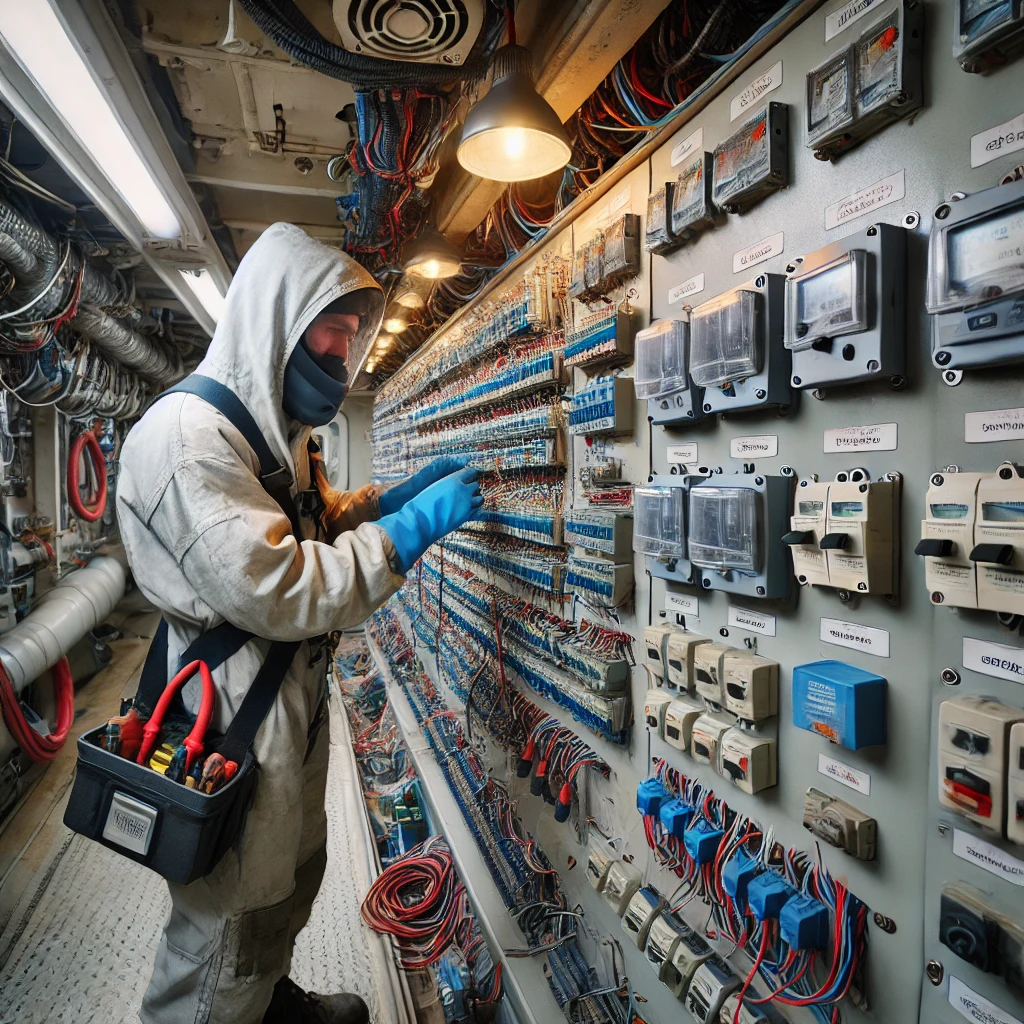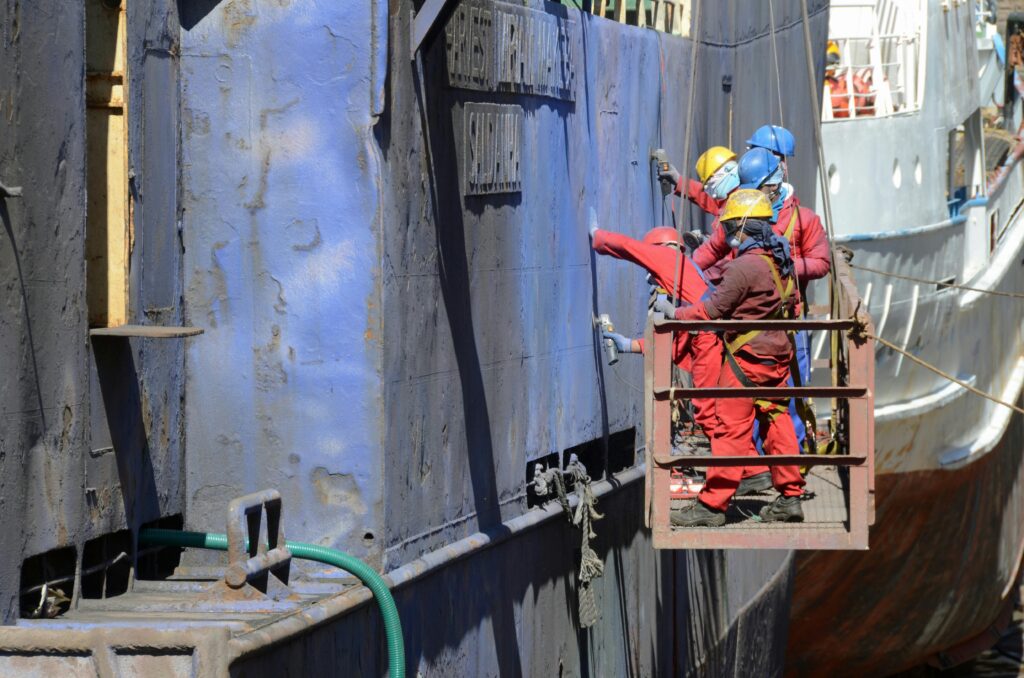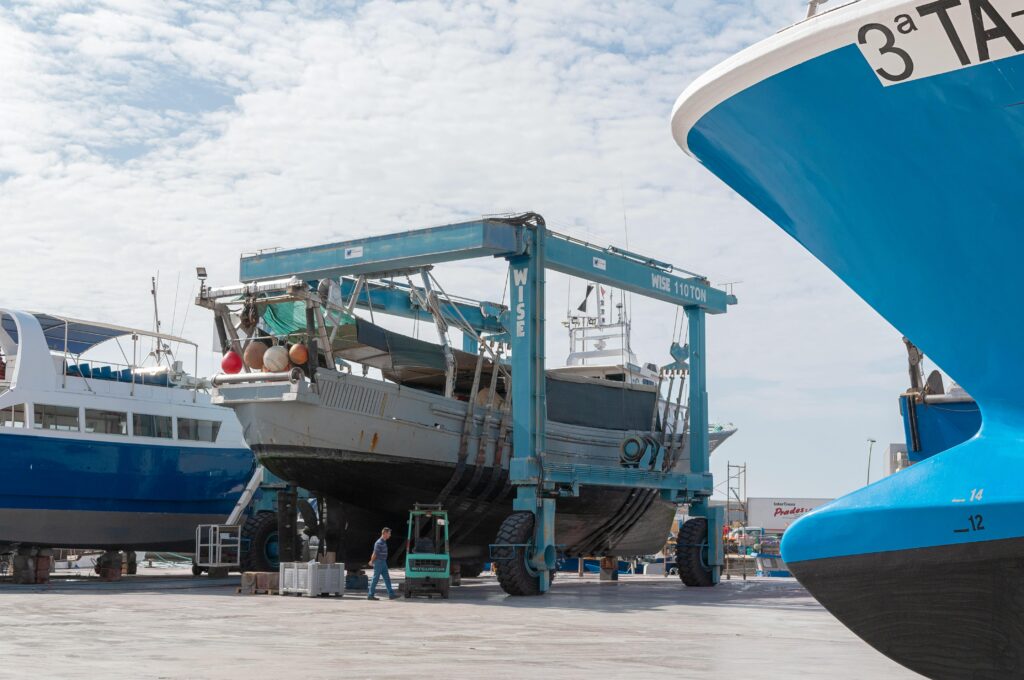What are shipbuilding services?
Shipbuilding services are like the secret recipe for a perfectly functioning ship - they include everything needed to build, maintain and bring ships to life. These specialized activities are at the heart of ship production and design. Shipyards play the role of the creative team that develops customized solutions to make ship projects a success.
Table of contents
- What are shipbuilding services?
- What are shipbuilding services?
- What types of ship repairs are offered?
- What role does ship production play in modern shipbuilding?
- What is the shipyard service and its importance for the industry?
- Why is ship design so important?
- How does ship maintenance work?
- What qualifications are required for shipbuilding engineers?
- Zeitarbeit International - Your partner in shipbuilding
Estimated reading time: 13 minutes
What are shipbuilding services?
It all starts with the planning, where really no detail is left to chance - every screwdriver knows where to go! Then it's on to the technical execution and assembly of the hulls until the ship finally takes shape. Machines are installed, and should the ship have a small breakdown, the repair services are already on hand to make it fit for the sea again. Here, every ship is treated like a real masterpiece. Without these services, there would be no ships sailing the seas.
What types of ship repairs are offered?
Ship repairs are like a quick emergency doctor for a ship - they ensure that everything runs smoothly and that the ship can continue to sail safely. Shipyards offer a genuine worry-free repair package, from minor scratches to complex repairs. Repairs to the hulls, engines and electrical systems are particularly important - because without these parts, a ship is pretty much lost at sea.
Ship repair services ensure that the ship runs safely and efficiently - after all, we don't want a ship to break down in the middle of the ocean and have to go to dry dock. And after delivery? Regular maintenance services are also required to keep the ship in top shape.


What role does ship production play in modern shipbuilding?
Ship production is the backbone of every shipyard - without it, no ship would ever see the water. It covers everything from the first line on paper to the shiny final assembly of the ship. Thanks to modern technologies such as automated production and digital planning, construction now not only runs faster, but also like clockwork. Today, ships are built with a perfect blend of traditional craftsmanship and high-tech wizardry - guaranteeing quality at its finest.
Who says that old craftsmanship and innovation can't go hand in hand? And ship production doesn't stop with new ships - it also includes repairs and modifications to existing ships to ensure that everything runs smoothly, whether new or "just serviced".
What is the shipyard service and its importance for the industry?
Shipyard service is like the all-inclusive package for shipbuilding - it ensures that everything really fits when it comes to building, repairing and maintaining ships. This includes designing ship shapes that not only work, but also look really good.
An excellent shipyard service guarantees that every project is completed on time and in top quality - after all, this is vital in the wild world of shipbuilding. Shipyards not only offer the production of ships, but also the necessary infrastructure to keep them fit and repair them immediately if necessary. Shipyard services ensure that everything runs smoothly - from the first draft to the final maintenance!
Why is ship design so important?
Ship design is much more than just a pretty exterior - it ensures that the ship not only looks smart, but is also safe, efficient and comfortable underway. It's not just about aesthetics, but also about the precise planning of the ship's components, which must work together perfectly like a well-coordinated team. A well thought-out design ensures that the ship glides smoothly over the waves and stays in top form for a long time. The combination of innovative ship design and modern technology creates energy-efficient, high-performance ships that meet the requirements of the maritime industry - and attract attention at the same time.
Ship maintenance is like a regular check-up at the doctor - it ensures that the ship remains in top shape after delivery and can safely conquer the waves. Regular inspections, repairs and refreshing the engines and systems are essential to prevent breakdowns and damage. After all, a well-maintained ship is a ship that lasts longer and is safer on the water.
How does ship maintenance work?
Ship maintenance is like a regular check-up for a ship - it ensures that everything runs smoothly after delivery and that the ship can travel safely at sea. Regular inspections, repairs and refreshing the ship's engines and systems are essential to prevent breakdowns and damage. Every part of the ship, no matter how important, is put through its paces - from the hull to the engines to the electrical systems. Without regular maintenance, no ship would remain in top condition for long.


What qualifications are required for shipbuilding engineers?
Shipbuilding engineers are the architects of the seas - they design, build and maintain ships that conquer the world's oceans. To get off to a good start in this field, they need more than just technical know-how; they also need to be true project managers who coordinate complex construction projects and ensure that everything runs like clockwork.
In addition, special certificates are a must, especially if it is to be international - safety certificates and welding qualifications are part of the standard repertoire. As shipbuilding never stands still, it is essential for engineers to undergo regular training and further education in order to keep up with the latest technologies and trends - after all, shipbuilding is not on standby!
Conclusion
Shipbuilding services are as diverse as the ships they create - from production to repairs and maintenance, it's a real all-round package! Shipyards are the invisible superheroes of the maritime world, ensuring that everything runs smoothly and that no screw is loose.
At the same time, there is a growing demand for qualified specialists who have the necessary expertise to bring ships safely and efficiently to their destination. Ship design, production, maintenance and repair - this is where innovation and experience come together to help shipbuilding companies successfully complete their projects. Whether the ship is conquering the high seas or lying in port - everything runs smoothly with us!
Zeitarbeit International - Your partner in shipbuilding
Zeitarbeit International is the reliable partner you need in shipbuilding when it comes to getting the right specialists on board! With our extensive network and expertise, we bring highly qualified workers from Eastern Europe and the Baltic states directly to your project - so everything runs like clockwork.
Whether for production, maintenance or repair - we are ready to actively support you with your next shipbuilding project. So, when it's "Full speed ahead!" again, you know we're the crew you need! Contact us and let's get on board together.
Similar topics

FAQ
Shipyards offer a real all-inclusive package in shipbuilding - everything is covered here, from building a ship to repairs, maintenance and modifications. But it's not just about screwing and tinkering! Specialized trades such as the assembly of machinery, the installation of piping systems and the painting of ships are also carried out. The shipyard service ensures that ships are not only built efficiently, but can also set sail with the latest technology on board. So, who says ships are just wood and steel when they can also be high-tech?
Ship production is like creating a masterpiece on the water - and there are some essential steps that must not be missed. First comes the construction and planning of the ship design, in which every line and every curve is carefully thought through. This is followed by the production of the individual parts of the ship, which are then assembled into sections in the next round.
As soon as all the parts have been assembled, the final assembly begins, during which the ship takes shape. Throughout the entire process, technologies such as automation and digital planning are used to make everything efficient and precise. And then? Finally, the ship undergoes a thorough testing and inspection process before it is released into the big, wide world. A real high-tech speedster that is ready for any adventure!
A shipbuilding engineer needs more than just a good knack for technology - they need to be a real all-rounder. To be successful, comprehensive knowledge of design, mechanical engineering and naval architecture is essential. But that's not enough! He must also be familiar with the special safety regulations and technical standards of shipbuilding.
His repertoire often includes a degree in shipbuilding or mechanical engineering as well as additional certificates for specialized activities such as welding techniques or safety certificates. A shipbuilding engineer is the captain of technology - and always well prepared.
Ship design is like the foundation of a house - it forms the solid basis for the entire ship production. It's not just about how the ship looks (although that doesn't hurt either!), but how it functions, is safe and works efficiently.
A well thought-out design ensures that the space in the ship is used optimally, that all parts work together like a well-coordinated team and that the ship also meets modern environmental requirements. After all, the ship should not only conquer the waves, but also sail into the future with head and heart!
Ship maintenance is like a regular health check for your ship - it ensures that everything runs smoothly and that the ship glides safely over the waves. This includes regular inspections, repairs and refreshing the engines and systems to keep everything up to date.
It is particularly important to check the ship's structure, maintain the engines and service the electrical systems. Thorough maintenance is crucial to avoid breakdowns during operation and to extend the service life of the ship - so that your ship always stays in top shape and is ready to embark on any voyage.
A ship repair starts like a visit to the doctor - first there's a thorough inspection to diagnose the "damage" exactly. Once it is clear what needs to be repaired, a plan is drawn up and then the specialized experts come into play.
They take care of everything: from hull and engine repairs to the electrical systems - your ship gets the full treatment. Once everything is repaired, the ship is tested and put through its paces before it is safe and fit for the next voyage. Almost like a spa treatment for your ship!
Modern ship production is no longer just about hammering and screwing - this is where advanced technologies come into play! Robot-assisted welding, 3D printing and digital planning ensure that everything runs efficiently and precisely.
These technologies not only reduce production times, but also minimize errors. In addition, there are sophisticated software solutions that help with the planning and visualization of ship projects to make the production process even better and faster. Shipbuilding has been given a technical turbo boost.
The construction time of a ship is like a good recipe - depending on the ingredients, it sometimes takes longer, sometimes shorter. A simple ship can be launched in a few months, while larger and more complex ships such as cruise ships or tankers can take several years. Factors such as the design, the capacity of the shipyard and the technical requirements determine how quickly the project progresses. The larger the ship, the longer the "preparation time" - but the wait is worth it.
Shipbuilders in Germany have to come up with a whole collection of safety certificates to ensure that they can work with the highly safe machines and materials. These include the SCC certificate (Safety Certificate Contractors) for work in safety-critical areas and VCA certificates that meet international safety standards.
For welders, ISO certificates also come into play to ensure that the welding work is not only of high quality but also safe. Safety is a top priority here - from planning to the last drop of weld.
Shipbuilding recruitment works like a well-oiled gear - often through specialized agencies that recruit skilled workers from different countries. These agencies carefully check the qualifications and certificates of the workers to ensure that they meet the high standards of shipbuilding.
As soon as the right specialists have been found, they can be quickly deployed in shipyards to complete projects efficiently and on time. Temporary work and employee leasing are frequently used models that ensure flexibility and quick solutions. In this way, shipbuilding is steered swiftly to the finish line.